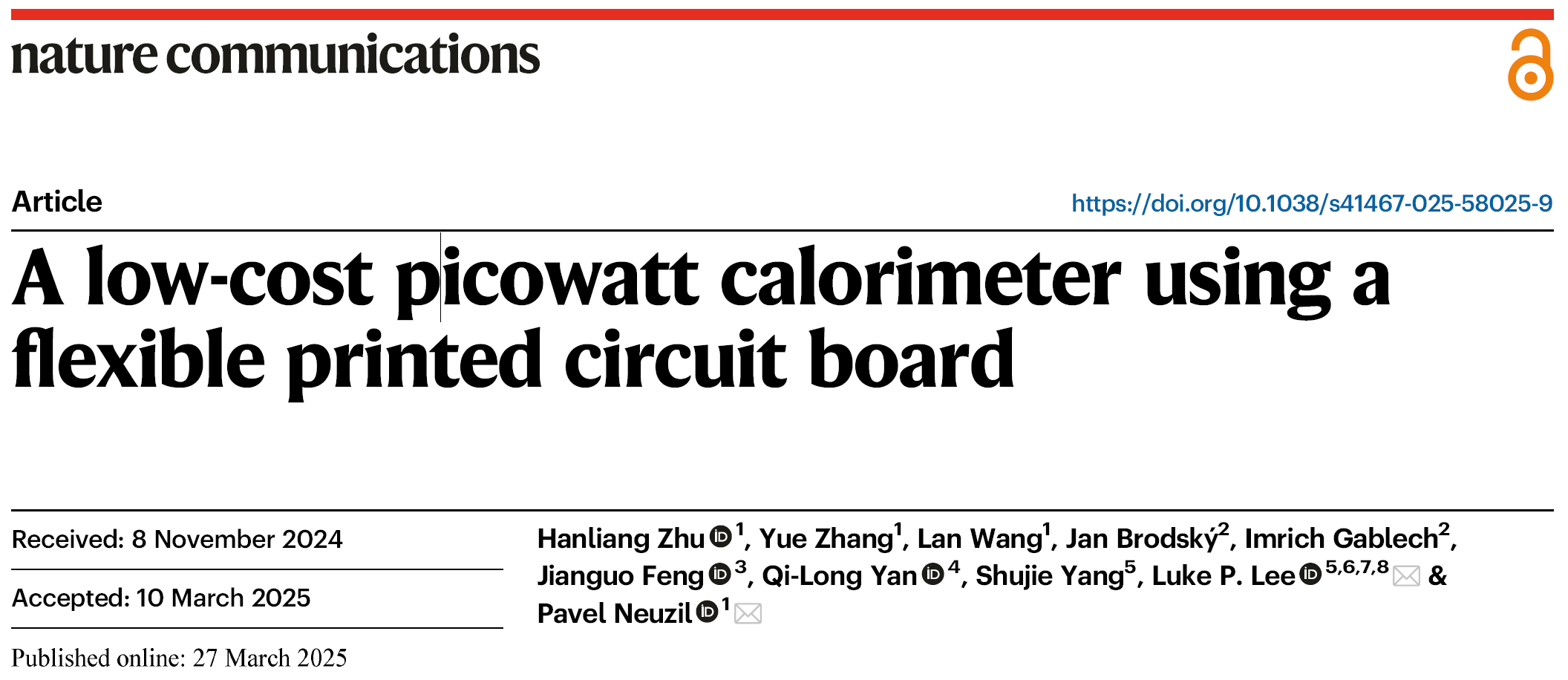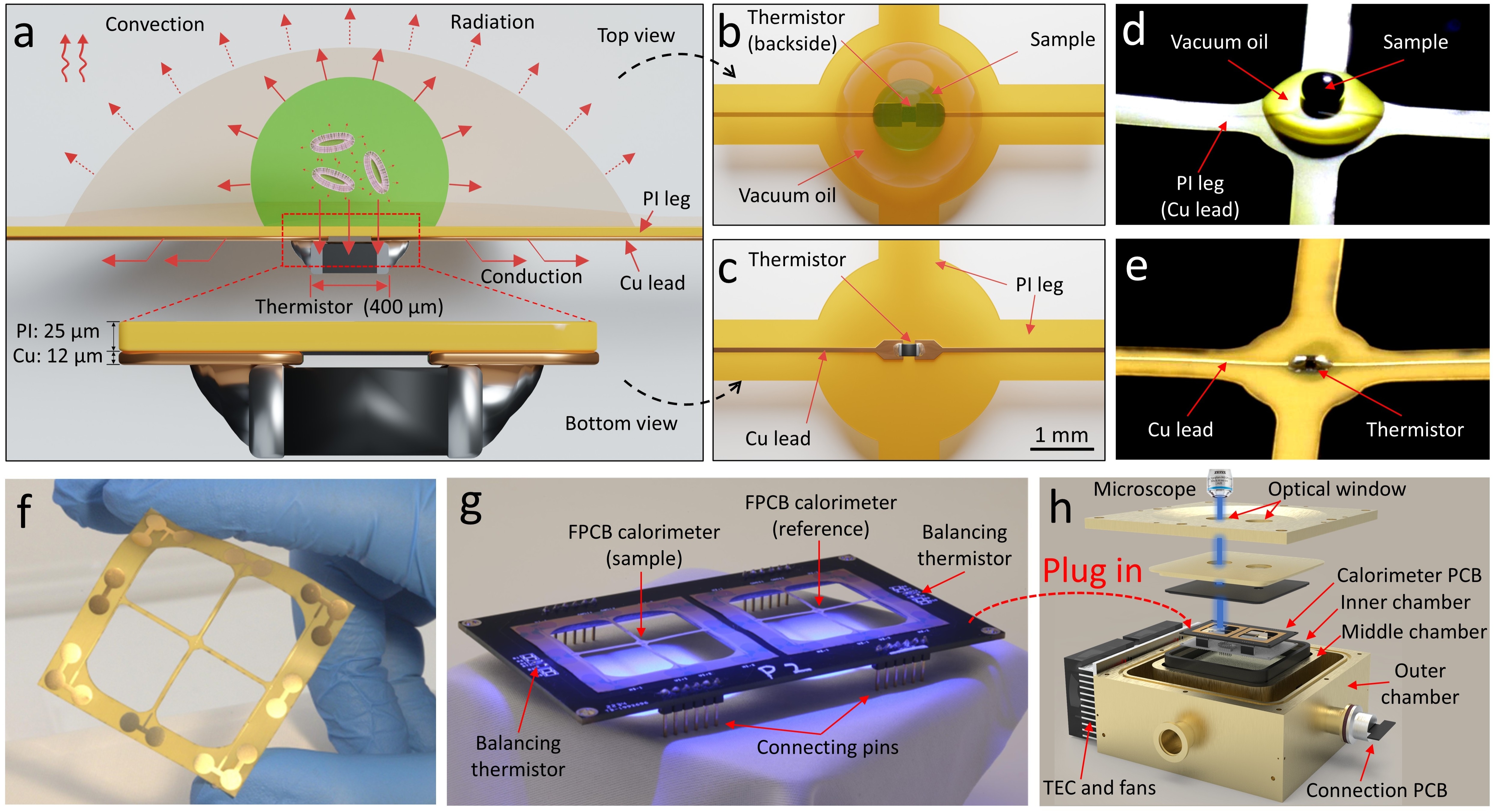The research achievement titledA low-cost picowatt calorimeter using a flexible printed circuit boardby Prof.Pavel Neuzil'sgroupat the School of Mechanical Engineering, Northwestern Polytechnical University, was published inNature Communications. This study was supported by funding from the National Natural Science Foundation of China and theNational Key Research and Development Program of China, among other projects. HanliangZhu, a Ph.D.studentat theSchool of Mechanical Engineering, served as the first author,while Prof.Pavel Neuzil and Prof.Luke P. Lee from Harvard University served as the co-corresponding authors of the paper.

Calorimeters are highly sensitive tools for directly measuring heat changes in chemical reactions and biological processes. Existingchipcalorimeters, relying on MEMS (Micro-Electro-Mechanical Systems) processes, have achieved sub-nanowatt-level heat flow detection resolution. However, there is a compatibility challenge between the micron-scale fabrication precision of MEMS technology and the hundred-micrometer-scale chip dimensions required for liquid detection. Critical steps such as multi-step photolithography, metal deposition/etching, andmembranerelease contribute to process redundancy and increased costs.
Prof.Pavel's researchgroupproposed the concept of a calorimeterusing flexibleprintedcircuit (FPC) technology and subsequently designed a picowatt-level calorimeterbased on FPC processes integrated with surface-mounted thermistors. Thecalorimeteris fabricated directly on flexible copper-clad laminates(FCCL)using FPC technology, eliminating the complex patterning andmembranerelease steps required in MEMS processes, thereby reducing manufacturing inconsistencies and costs.The calorimeters employedstandard thermistors for temperature measurement. Theyincorporatedhollowed-out structures to minimize thermal loss,achievingthermal conductanceand heat flow sensitivity of109.0 µW·K-1and227 V·W-1, respectively, positioning it at the forefront of liquid measurementcalorimeters. A low-noise, stable measurement system tailored for liquid samples was developed, achieving temperatureand heat flow resolutions of6 µKand654 pW, enabling simultaneous monitoring of sample morphology and thermal changes. The study demonstrates that the FPC-based microcalorimeterdelivers high-performance detection while significantly reducing process complexity and R&Dexpenses.

Figure 1:The FPC-basedpicowatt-levelcalorimeterand integrated morphology-heat synchronous monitoring platform developed by Northwestern Polytechnical University (NPU).
Prof. Pavel Neuzilis a professorat the School of Mechanical Engineering, Northwestern Polytechnical University,asaNational Specially-Appointed Expertsince 2015.He co-founded theMicro-Nanofluidic Technology Talent HubLaboratory withProf.HonglongChang and serves as itsChief Scientist. Prof.Pavelhas deep knowledge of electrical and mechanical engineering, physics, chemistry, analytical chemistry, and optics. His research interests are miniaturized medical and analytical devices, integrated smart instruments, and nanotechnology.He published over 250 high-profile journal and conference papers, includingNature Medicine,Nature Reviews Drug Discovery,Nature Communications,AngewandteChemie,Nano Letters,etc.He also submitted over 20 international patent applications, of which 15 were granted. He has 8,700 citations,and his H-index is 42. He is an editor oftheElsevier journalApplied Materials Today. In 2023,he received theChinese Government Friendship Awardfor outstanding contributions to scientific research and talent cultivation in China.
URL:https://doi.org/10.1038/s41467-025-58025-9
